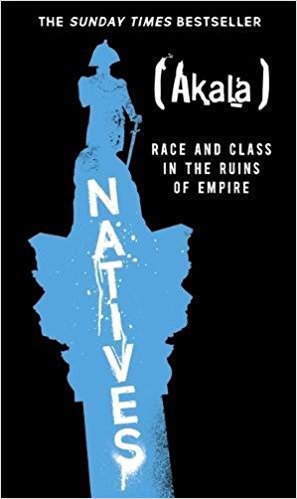Akala is a multi-talented guy. Not only is he a MOBO winning hip-hop artist he is also a poet, public speaker, activist and has regularly featured as a political commentator on Newsnight, Question Time, etc.
Tonight he makes his Edinburgh International Book Festival debut to talk about his debut book Natives. The book is part autobiographical and part political history, focusing on race relations in the UK. The event opens with a reading from the book. Here we learn a bit about Akala’s early life how he first smoked dope at nine, was first stopped and searched by the police at 12. As well as his general experiences as a mixed race child in the 80s and 90s. He sets this against the bleak racial landscape of 80s Thatcher Britain highlighting the New Cross Fire and other racial flashpoints.
After this sobering passage from the book we get to the interview portion with chair Heather Parry. She opens by asking him more about early brushes with racism as well as what made him a political person. He gives long, considered answers to both questions. In the case of racism talking about a particular incident at school as well as his maternal granddad ridiculously suggesting he paint himself white. In terms of politic influences, he talked warmly about the influence of his Uncle Offs. As well as this he says his mother sending him to a Pan-African Saturday school introduced him to a lot of black radical theory.
It is clear from very early on Parry won’t need to ask much in the way of questions as Akala’s answers are extensive. The most frequently repeated phrase of the night being: “And this will be my last point on that”. This is not a criticism, as his answers may be long and tangential, but they are also witty and informative. It’s is also impressive the sheer range of topics covered over the hour including; the problems of the term “Black on black violence”, racial profiling and the inefficiencies of the prison system to name just a few. The talk also gave a decent insight into Jamaican culture/politics and the islands historical relationship with the UK.
Another impressive feature of the talk is that while Akala can talk informatively on a variety of topics, he also always underlines when he cannot. An element which is highlighted when he answers an audience question on whether Britain would benefit from more socialist policies. In his answer, he responded by saying he is “emotionally socialist” but lacked the economic wherewithal to know about its impact in those terms. While hardly a startling admission such things do seem amazing in this Internet era of entrenched know-it-all opinion. After this, he lamented the lack of nuanced argument on the topic which is not something you could accuse Akala himself of over the course of this impassioned and insightful hour.
